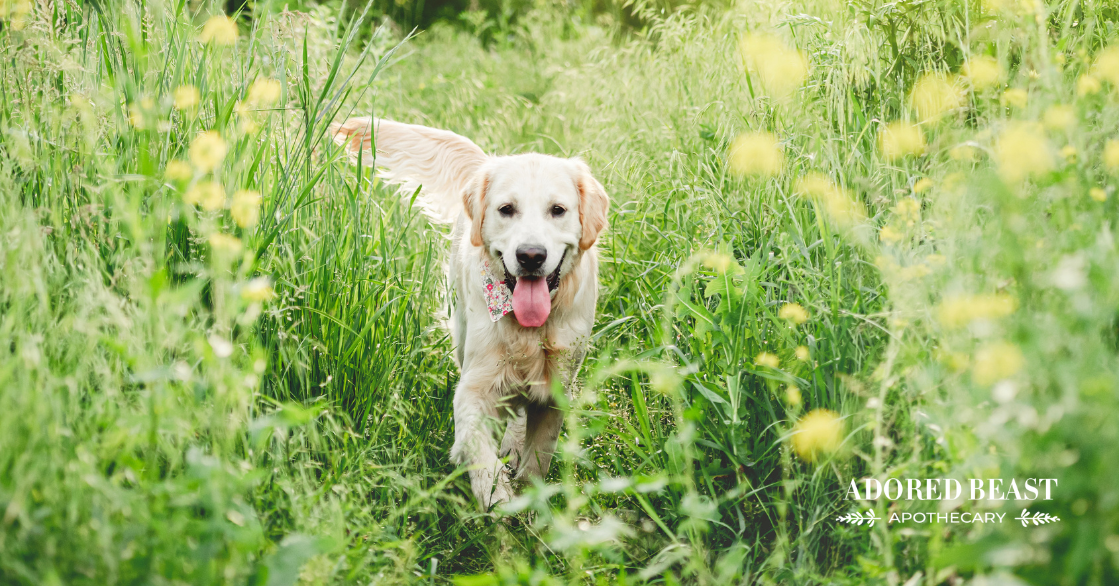Stress…
We’ve all felt it a time or two (or more). It’s uncomfortable, annoying, and sometimes downright debilitating!
And stress is not just a human experience; our canine companions can also feel stressed in various situations. As responsible pet parents, it’s essential to recognize the signs of stress in dogs and learn how to effectively manage and reduce it.
What is Stress & How Does it Affect Dogs?
Stress is a natural physiological response that occurs when an individual (in this case, your dog) perceives a threat, challenge, or demand that exceeds their ability to cope. When faced with a stressful situation, the body releases hormones such as cortisol and adrenaline, triggering the “fight-or-flight” response.
Dogs can experience stress for a variety of reasons, including changes in their environment, routine disruptions, fear of certain situations or stimuli, loneliness, boredom, or even physical discomfort.
It’s important to note that stress is not inherently negative; it can motivate and prepare us to respond effectively to various situations. However, chronic or excessive stress without proper coping mechanisms can have detrimental effects on your adored beast’s physical and mental health.
Here are some ways stress can affect a dog’s health:
- Weakened Immune System: Chronic stress can suppress a dog’s immune system, making them more susceptible to illnesses and infections. This can lead to frequent illnesses and a longer recovery time.
- Digestive Issues: Stress can affect a dog’s digestive system, leading to symptoms like diarrhea, constipation, or vomiting. It can also exacerbate underlying gastrointestinal conditions such as inflammatory bowel disease.
- Skin and Coat Problems: Stress can contribute to skin issues in dogs, including excessive scratching, hair loss, or the development of hot spots. These skin problems may persist if the underlying stress is not addressed.
- Behavioural Changes: Dogs under stress may exhibit changes in behaviour, such as increased aggression, excessive barking, or destructive chewing. They may also become withdrawn or overly clingy.
- Increased Risk of Obesity: Some dogs may cope with stress by overeating or consuming more treats, leading to weight gain and obesity-related health issues.
- Musculoskeletal Problems: Stress can cause tension and muscle tightness in dogs, leading to discomfort, stiffness, or even exacerbating existing musculoskeletal conditions like arthritis.
- Compromised Mental Health: Prolonged stress can negatively impact a dog’s mental health, leading to anxiety disorders, depression (which can look like fatigue), or phobias that can affect their overall quality of life.
- Impact on Lifespan: Chronic stress has been linked to a shortened lifespan in dogs, as it can contribute to the development of serious health problems (including cancer and cushing’s disease!) over time.
Signs of Stress in Dogs
It’s crucial to be observant of your dog’s behaviour to detect signs of stress early. Some are very subtle, while others are more obvious and easy to notice.
- Excessive Panting or Drooling: Rapid or heavy breathing can be a sign of stress.
- Yawning or Lip Licking: Dogs may yawn or lick their lips when feeling anxious.
- Whining or Barking: Increased vocalization without an apparent reason can signal stress.
- Shaking or Trembling: Physical trembling can indicate nervousness or fear.
- Hiding or Avoidance: Dogs might retreat or hide in response to stressors.
- Destructive Behaviour: Chewing, digging, or other destructive behaviours can be a result of stress.
- Loss of Appetite: Stress can impact a dog’s eating habits.
- Excessive Licking or Scratching: Stress can manifest as compulsive behaviours like excessive licking or scratching.
- Eating their own poop.
- ANYTHING OUT OF THE ORDINARY! You know your dog best, so watch for signs that they’re just not themselves. Stress could be the culprit.
Natural Ways to Reduce Dog Stress
It’s clear that we definitely don’t want our dogs dealing with chronic stress.
So what can we do to help bring those stress levels down and help bring about a calm balance the body and mind? A lot of things actually!!
- Regular Exercise: Maybe you’ve heard that physical exercise is great for human stress? It’s true. And this also applies to our animals. Physical activity helps release pent-up energy and reduces stress. Go for a walk or a hike, take a dip in the lake, sign up for agility, or do some mental exercise with a brain game or two. Of course, be mindful of their age and abilities (seniors and puppies have different exercise needs than teenage/adult dogs).
- Create a Safe Environment: If there are particular triggers at home – or in certain situations (fireworks, for example), make sure your dog has a safe space they can retreat to if feeling overwhelmed.
- Routine and Predictability: Dogs thrive on routine. Maintaining consistent feeding times, walks, and play sessions can help create a sense of security.
- Calming Supplements: Natural supplements like homeopathic aconite and arnica, chamomile, flower essences (Rescue Remedy for pets), or CBD oil can help reduce anxiety in dogs. And although it’s often forgotten about, there’s a big link between the gut and the brain! Support that gut-brain axis. We’ve had great reviews from people about The Wolf helping with anxious pups!
- Aromatherapy: Certain scents like lavender or chamomile can have a calming effect on dogs. Use a diffuser or spray these scents in their living area. BUT! Make sure you’re using only a very, very small amount (like no more than 1 drop), use it in a well ventilated space, and pay attention. Some dogs don’t like these, and so it can have the opposite effect.
- Massage and Touch: Gentle massage or cuddling can promote relaxation and strengthen the bond between you and your dog.
- Watch the Temperature: If your animal does’t like too much heat, this can easily stress them out! If they’re warm, give them air flow. Turn on a fan, put their bed near the window. Watch their panting, and if they’re asking to go in and out they could just want fresh air.
- Music Therapy: Soft, classical music or specific pet-calming music can soothe anxious dogs when left alone.
[RELATED] Find more valuable stress-reduction resources right here!
The Human-Dog Bond and Stress
It’s important to recognize that dogs are sensitive to our emotions. When we are stressed, dogs may pick up on our cues, further affecting their stress levels. If there’s stress in the home, all family members will feel it. Therefore, managing our stress can positively impact our dogs’ well-being. Take time to relax, practice mindfulness, and maintain a calm demeanour around your dog. And, being aware of and watching for our dogs’ stress can help make us healthier! It can be that lightbulb moment for you regarding your own stress levels. Take advantage of that – it will help everyone in the home.
Stress is a common issue that can affect dogs of all breeds and ages. By understanding the signs of stress in dogs and using natural stress-reduction techniques, we can help our canine companions lead happier, healthier lives. Remember, if your dog’s stress persists or worsens, consult your trusted veterinarian or professional trainer for personalized guidance. Together, we can create a harmonious environment where our dogs feel safe, loved, and stress-free.












